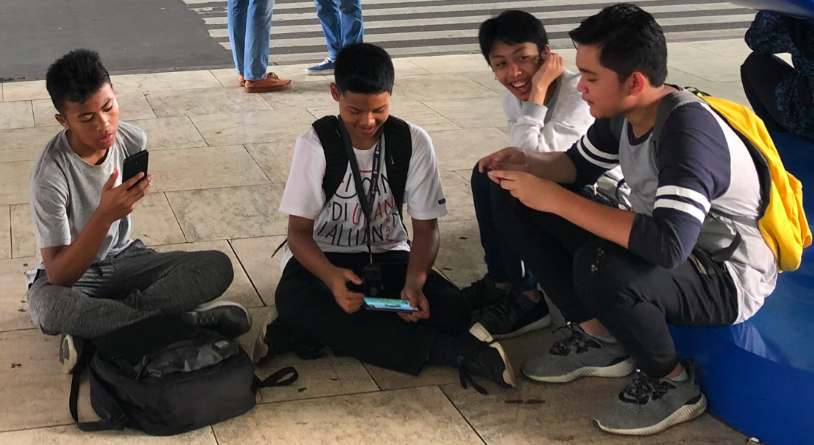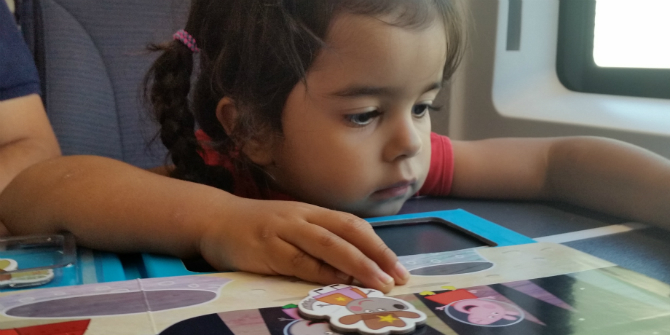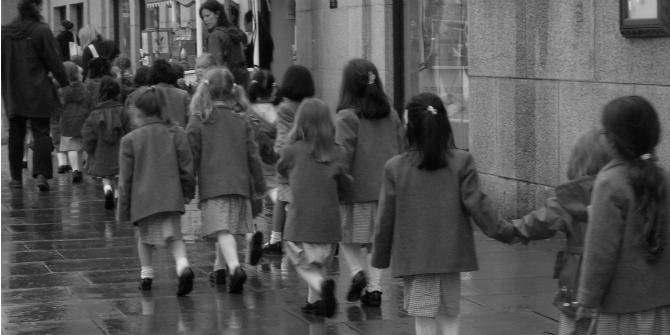 Amidst ongoing focus on the difficulties many new mothers face in the period after having a baby, attention has recently been paid to the struggles new fathers might have to contend with, as well. For www.parenting.digital, Dr Paul Hodkinson and Dr Ranjana Das discuss a spectrum of digital engagement by new fathers in coping with mental health struggles, drawing on their new book. Digital media offer clear potential as outlets for fathers, particularly in the agentic possibilities they afford. Still, the role of digital media is varied both between different fathers and within the context of individual journeys. While some forms of engagement involve distraction or disconnection, others include different levels of information- or support-seeking.
Amidst ongoing focus on the difficulties many new mothers face in the period after having a baby, attention has recently been paid to the struggles new fathers might have to contend with, as well. For www.parenting.digital, Dr Paul Hodkinson and Dr Ranjana Das discuss a spectrum of digital engagement by new fathers in coping with mental health struggles, drawing on their new book. Digital media offer clear potential as outlets for fathers, particularly in the agentic possibilities they afford. Still, the role of digital media is varied both between different fathers and within the context of individual journeys. While some forms of engagement involve distraction or disconnection, others include different levels of information- or support-seeking.
At the heart of our book is an emphasis on how societal expectations of new fathers can exacerbate the mental health difficulties they might face and prevent them from communicating with others. Against this context, we explored the extent to which digital media might provide opportunities to negotiate and manage these struggles. We identified a spectrum of digital engagement exhibited by fathers as part of their journeys of coping, drawing on interviews with 15 new fathers discussed in our recently published book New Fathers, Mental Health and Digital Communication.[1]
The most notable forms of engagement relate to experiences of disconnection, distraction, learning and listening, reaching out, and supporting others. Across the spectrum, we also identified a range of ‘small acts of engagement’, by which we mean – apparently ‘low-key’ or ostensibly ‘passive’ forms of mediated engagement which were sometimes of great significance for fathers’ coping journeys.
Disconnection
So what’s happened with my Facebook is if someone were to do the stats on it, they’d probably find it quite funny, it’s gone from being loads of friends and feeds and stuff, to basically having unfollowed virtually every friend I have (David).
Research on the disconnective practices of media users has sought to highlight the role strategic forms of disengagement – from selective acts of reducing friends’ lists to termination of social media accounts – might play in how individuals navigate digital environments, pervading their management of interactions, relationships and wellbeing amid cultures of connectivity. Such disconnective practices were visible in the coping journeys of a few fathers in our study, like David. For him, online connections with certain individuals, groups or whole platforms had come to feel detrimental amidst what he was going through. Rather than comprising digital withdrawal, we suggest, these disconnective practices should be seen as agentic means to manage interactions or reclaim some degree of control.
Distraction
You kind of get immersed in that… world, where you, you’re never friends with anyone on social media, but there’s interaction and you kind of enjoy that aspect… I definitely felt like it was an outlet for me when I knew that I couldn’t engage externally because of the responsibility of fatherhood (Oliver).
Some found that digital engagement unrelated to their struggles had helped them to cope by directing thoughts and feelings elsewhere. Oliver, who had suffered from acute loneliness and isolation as part of his post-natal struggles, found himself using Twitter to help take his mind off the domestic sphere in which he felt so trapped. He had become immersed in everyday goings-on amongst his networks, describing his tendency to like or share ‘nonsense’ as a form of an ‘escape’. This is another example, we argue, of an agentic and conscious approach to coping.
Learning and listening
You can read about it and realise that it’s not just you… when it first happens, because you’ve never had to deal with it, you have no knowledge of it, you have no understanding of it, which makes it ten times harder because it’s just out of the blue…. it kind of linked through to their website, where it would be people talking about their experiences… it kind of gives validation to the fact that it was real (Rob).
In the absence of prior knowledge about fatherhood and mental health, many fathers found that the act of searching for information was an invaluable first step towards recognising their difficulties and starting to make sense of them. Reading about similar experiences shared by others sometimes had profound importance as a moment in which difficulties were acknowledged and validated, as Rob outlines above.
Reaching out
I think there’s been a few things where I’ve tried to kind of put myself out there a little bit … I shared it [an article on mental health] on Facebook, and maybe I think selfishly thought I might get a bit of a response… not necessarily cry for help, but I kind of was hoping for someone of my, any of my friends to see that and go… ‘Hold on a minute, why is he sharing that?’ (Oliver).
Occasionally, fathers had, at a particular point in their struggles, begun to feel able to disclose their difficulties openly and explicitly to others through social media. More often, however, acts of disclosure tended to be more tentative, uncertain or implicit, among men finding the notion of openly seeking support profoundly challenging. Oliver’s sharing of an article about mental health represented a gesture of great affective significance, even though he felt unable to reach out for help directly.
Supporting others
Any items that I find on male mental health generally I tend to share or re-tweet. … I did a radio… interview, as part of the project, and a lot of people heard that on there, and I received quite a lot of plaudits from people saying, well done for sharing your experience… So it, it’s allowed me to feel that some good was coming from my experience, so it helped the healing process (John).
For some of the fathers, being able to disclose and discuss their own perinatal difficulties had begun to prompt a determination to turn their experience into something that might help others going through similar problems. One or two had gone on to share their own experiences more publicly and repeatedly, had set up online resources for others, or become active within campaigns to raise awareness and affect change.
While this spectrum helped us to highlight key patterns as part of men’s journeys, these categories are not be understood as mutually exclusive. Individuals may shift between the different modes during the course of their uneven coping journeys, they may engage at more than one mode at the same time, or may oscillate between them at different frequencies. Across this fluid spectrum were numerous examples of small, tentative acts of engagement that could hold much agentic significance as part of uneven struggles to cope or recover.
The struggles new fathers can experience are embedded in the challenging nature of the process of having a baby and in complex sets of societal pressures and expectations. While experiences were decidedly mixed, our study showed how uses of digital media might sometimes offer possibilities for small, tentative steps towards managing and coping with such difficulties.
To find out more…
- Book launch: you can hear more about the broader project, including the structural patterns which position fathers as peripheral, stoic supporters-from-the-sidelines in the process of having a baby;
- A short video: we summarise key arguments from the book.
[1] We conducted wide-ranging semi-structured interviews with UK men who felt they had experienced mental health difficulties in the first year or two of their baby’s life and felt online communication had played a role in their experience. Our sample of 15 fathers came from a wide range of circumstances as well as diversity with respect to digital media use, even though the sample had a white and broadly middle-class bias.
First published at www.parenting.digital, this post gives the views of the authors and does not represent the position of the LSE Parenting for a Digital Future blog, nor of the London School of Economics and Political Science.
You are free to republish the text of this article under Creative Commons licence crediting www.parenting.digital and the author of the piece. Please note that images are not included in this blanket licence.
Featured image: Photo by Pexels on Pixabay





